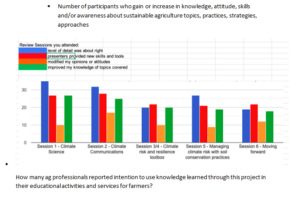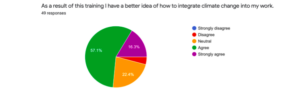Final report for WSP20-007
Project Information
Our state stakeholder advisory committee will meet in May and discuss priority Sustainable Agriculture topics in Oregon. Based on the discussion, we will choose an Sustainable Agriculture topic to focus on for 2021 that can be applied throughout the state. Because Eastern and Western Oregon have very different climates and Oregon also has highly diverse farms, ranches and cropping systems, we will attempt to decide on a topic that is relevant to farmers and ranchers in all parts of the state.
Beginning in 2019, the Advisory Committee selected a priority topic for the year, which may be recurring over the course of two or more years. Once the priority topic has been decided, the AC and state coordinators will work together to come up with a strategy for delivering educational programming on the topic. In 2019, the AC chose the topic of hemp production in Oregon, and as a result, we organized a two-day training for agricultural professionals who will disseminate information to their counties during the spring and summer of 2020.
Once we decide on a topic with the AC, whether we chose to offer more programing on hemp or on another topic, we will plan a multi-day, statewide training to be followed by at least four regional trainings.
Objectives of this project include:
- Work with the Advisory Committee to identify statewide priority topic in sustainable agriculture
- Develop a strategy for delivering educational programming to address topic
- Increase knowledge, skills and technical capacity of agricultural professionals on this topic
- Increase knowledge, skills and technical capacity of farmers and/or ranchers on this topic
- Assess success of educational programming and determine whether or not to address same topic 2022
Advisors
Education
A steering committee of agricultural professionals met monthly for six months to develop a curriculum for a three day, six module workshop for ag professionals on climate resilient farming.
Education & Outreach Initiatives
Increase knowledge of technical service providers, farm advisors, and researchers to better support growers in their transition to farming for climate resilience.
- 6 virtual sessions, November 2-4 2021 from 10am-Noon and 1:00-3:00pm pacific time each day
- 1 resource website featuring: 6 farm profiles/ case studies, 2 slide decks on climate and agriculture, 2 videos plus slide decks on soil health, see resource website here: https://www.oregonclimateag.org/_files/ugd/49fc7a_962ccbe73520428191614aa662adb78b.pdf
- 276 Ag professionals attended the training.
73% or survey respondents agreed or strongly agreed with this statement: as a result of this training, I have a better idea of how to integrate climate change into my work.
See Table 1 for feedback on improved knowledge, skills and tools in specific sessions. Generally speaking, respondents reported 50-95% increase in knowledge, skills and tools.
Educational & Outreach Activities
Learning Outcomes
Project Outcomes
The planning team for this event was a mix of NRCS, OSU and OSU Extension, SWCDs, the NW Climate Hub, and Cultivating Resilience, LLC. This collaboration not only increased outreach and participation but also improved the content of our training. Unexpectedly, we began building a new community of practice within the planning team itself. We became a group that was coordinating, sharing information, and learning from each other across silos, and even within organizations like Oregon State University.
As a result of the training, a new local working group of agricultural service providers in the Lower Willamette Valley has been formed. Their focus is on continued training and working together on climate resilience for farmers and ranchers in their region. Two Soil and Water Conservation Districts in the area took the lead and are working with five additional SWCDs as well as NRCS staff and OSU Extension in their region – initial list of forty-four staff invited to the regional workgroup.
“The training was inspiring. It gave me new ideas for outreach to producers for installing soil health practices and made connections with other groups to partner with on projects and outreach. Bravo!”
“It was really great hearing from a diverse group of voices, especially the grower panels. There was a lot of fabulous information presented and I liked the small group breakouts to help with networking and thinking through ideas.”
“I've been interested in soil health since 2006 and attended many soil health and conservation trainings. This training was so well orchestrated! Each presenter had unique, valuable information to share. Information that I had not heard applied to conservation work was abundant. The potential for collaboration, community, and hope far exceeded expectations and filled important current needs. Each partner contributed vastly to my work. It has been a long time since an event has activated my brain cells like this great event did!”
“This was an exceptional training presentation. The speakers were leaders in their fields, the presentations very clear and well done, and the overall experience valuable and inspiring.”
“To advance the work I do, I will need to collaborate directly with agency staff and knowing they are now versed in the concepts, challenges and tools will accelerate engagement with farmers and practices on the ground. Fantastic!”
Additionally. ag professionals in Polk county are organizing a climate resilience workshop based off the training. The training audience is for farmers, featuring other farmers along with OrCAN and NRCS.
Face of SARE
We promoted the SARE program with all of our outreach to OR NRCS, OSU Extension, SWCD and Watershed Councils, non-profits, and other state agency staff. Outreach also appeared in newsletters across the region from the USDA NW Climate Hub to the Oregon Conservation and Education Assistance Network.
Information Products
- A Climate Resilience Toolbox for Working With Oregon’s Farmers and Ranchers (Article/Newsletter/Blog, Conference/Presentation Material, Decision-making Tool, Training Agenda)

